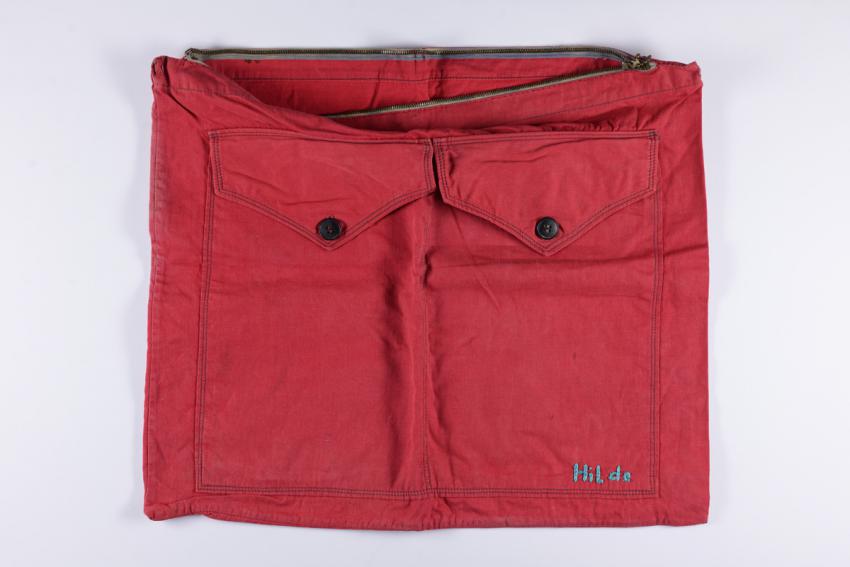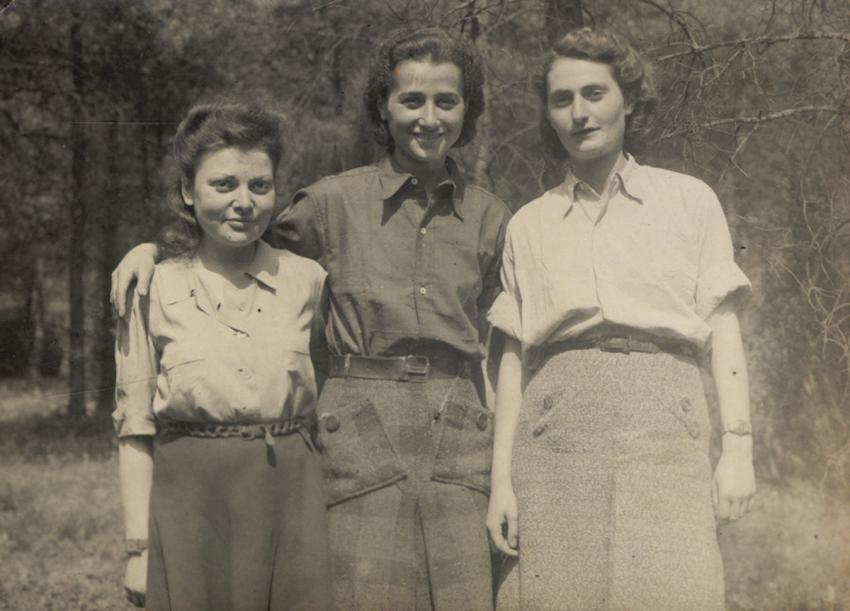
Yad Vashem Artifacts Department
On loan from Hilde Grünbaum Zimche, Kibbutz Netzer Sereni


Yad Vashem Artifacts Department
On loan from Hilde Grünbaum Zimche, Kibbutz Netzer Sereni

Sunday to Thursday: 09:00-17:00
Fridays and Holiday eves: 09:00-14:00
Yad Vashem is closed on Saturdays and all Jewish Holidays.
Entrance to the Holocaust History Museum is not permitted for children under the age of 10. Babies in strollers or carriers will not be permitted to enter.

Yad Vashem Artifacts Department
On loan from Hilde Grünbaum Zimche, Kibbutz Netzer Sereni


Yad Vashem Artifacts Department
On loan from Hilde Grünbaum Zimche, Kibbutz Netzer Sereni

Hilde, the only child of David and Suzanna Grünbaum, was 15 when her father was expelled from Germany to Poland in the Zbaszyn deportation, and her mother was imprisoned after attempting to obtain false transit permits to Belgium for herself and her daughter. Despite her mother's entreaties, Hilde refused to leave Germany on the Kindertransport while her mother was in prison.
In 1940, 17-year-old Hilde joined a Hachshara (pioneer training scheme) group of young people with the aim of immigrating to Eretz Israel (Mandatory Palestine). In April 1943, the members of the Hachshara group were arrested and deported to Auschwitz-Birkenau. Despite the horrendous conditions and the inherent danger, the girls from the Hachshara group made every effort to stay in contact while imprisoned in the camp. Their counsellor, Anne Borinski, acted as chief liaison in the women's camp. The girls passed information from one to the other via little notes, and did their best to look out for each other. Once a week, Hilde organized an "Oneg Shabbat" (Sabbath celebration), during which she would read from books that she managed to obtain from "Kanada" workers (inmates who were assigned to sorting through victims' possessions). Maintaining morale was essential to survival in the camps, and these meetings were thus extremely important. On Hanukkah, they lit candles in a paper Hanukkah menorah . "In this way, we preserved the customs that we were used to observing, and perhaps they also kept us alive", relates Hilde.
When the women's orchestra was established at Birkenau, the search began for musicians amongst the inmates. "They came and asked who plays an instrument, and Hilde played the violin, not well, but well enough. So we talked amongst ourselves, and she decided that she would go as our representative, and check it out. If it was good, we would follow her, and if not – at least only one of us would suffer. And so it was. She joined the orchestra, and after a very short time, they came and took me and my sister." (Excerpt from the testimony of Shulamit Wagenberg Calif).
The conductor of the orchestra was virtuoso violinist Alma Rosé, Gustav Mahler's niece and daughter of Arnold Rose, one of Europe's leading violinists. Alma saw the orchestra as a means for the women to survive. She arranged orchestral works that would suit her musicians and their instruments, and saw to it that the members of her orchestra had better living conditions.
Hilde succeeded in bringing more Hachshara girls to the orchestra, and organizing extra food for the others. She started out playing the violin, but after an illness prevented her from playing, she became responsible for the sheet music and acted as Alma Rose's personal assistant. Hilde's friends in the "Kanada" commando smuggled out a pillowcase for her, and Hilde used it to sew a cloth case for the sheet music.
Alma Rose did not survive Auschwitz. Hilde survived and preserved the sheet music case and the personal effects of the courageous conductor whose actions saved the majority of the women in the orchestra.
In November 1944, the Jewish women in the orchestra were evacuated to the Bergen-Belsen camp, and Hilde was liberated there some six months later.
Hilde met Azriel Zimche in a DP camp, and they eventually got married. She immigrated to Eretz Israel together with the few Hachshara members who survived the Holocaust.
Yad Vashem Artifacts Department
On loan from Hilde Grünbaum Zimche, Kibbutz Netzer Sereni

Thank you for registering to receive information from Yad Vashem.
You will receive periodic updates regarding recent events, publications and new initiatives.

"The work of Yad Vashem is critical and necessary to remind the world of the consequences of hate"
Paul Daly
#GivingTuesday
Donate to Educate Against Hate


Worldwide antisemitism is on the rise.
At Yad Vashem, we strive to make the world a better place by combating antisemitism through teacher training, international lectures and workshops and online courses.
We need you to partner with us in this vital mission to #EducateAgainstHate
The good news:
The Yad Vashem website had recently undergone a major upgrade!
The less good news:
The page you are looking for has apparently been moved.
We are therefore redirecting you to what we hope will be a useful landing page.
For any questions/clarifications/problems, please contact: webmaster@yadvashem.org.il
Press the X button to continue



